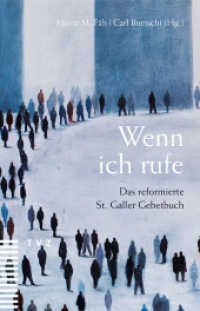- ホーム
- > 洋書
- > ドイツ書
- > Humanities, Arts & Music
- > Linguistics
- > general surveys & lexicons
Full Description
This book addresses contemporary translator training, discussing the various ways translators (and other language professionals) acquire and perfect their skills in rapidly evolving markets and a complex global context. The authors examine formal and more 'traditional' types of training, such as postgraduate degree and certificate programs, but also examine and propose alternative types of knowledge acquisition and skills-building, such as ongoing professional development, workshops, peer-to-peer learning, and community-based or non-academic initiatives. The book critically examines translator training (in a broad sense) in Canada, though the chapters will be applicable and relevant in other contexts, especially bi- and multi-lingual settings. The fact that Canada's demolinguistic profile is increasingly heterogenous suggests that the need for translation and multilingual communication - and thus adequately trained language/multilingual professionals - is not only real, but pressing, a situation mirrored in other regions around the world. This book's findings will be relevant to academics, students, and practitioners in fields including Translation Studies, Professional Education, Additional Language Learning, Canadian Studies, and Language Policy and Planning.
This project was an equal collaboration of Renée Desjardins and Valérie Florentin.
Contents
Chapter 1: Introduction (by Renée Desjardins and Valérie Florentin).- Chapter 2: Social justice Pedagogies for Translators' Education: A personal journey as a starting point (by Anne Beinchet).- Chapter 3: Plain language as a Form of Social justice: What role for translator education in Canada? (by Lynne Bowker).- hapter 4: Diversity, Inclusivity and Equity: The Canadian landscape and a few avenues for implementation (by Valérie Florentin and Alexandra Hillinger).- Chapter 5: Are French Translation Textbooks Compatible with Critical pedagogies? Unpacking linguistic ideologies in La traduction raisonnée (by Arianne Des Rochers).- Chapter 6: Constructive alignment in Translator Education: Beyond course and program design (by Álvaro Echeverri).- Chapter 7: Some Insights into Process-Oriented Translation Assessment (by Christine York).- Chapter 8: Meeting Students Where They Are: A case for integrating social media literacy into core curriculum in translator training (by Renée Desjardins).- Chapter 9: Affect and/as Pedagogy in Community Interpreter Training: Approaches from a classroom in British Columbia (by Irem Ayan).- Chapter 10: Transforming Terminology Teaching by Joining Together Contemporary Pedagogical European-centred Principles with Traditional Pedagogical Indigenous Values (by Philippe Caignon).- Chapter 11: Work Integrated Learning and Talent Development: How transformational learning can shape future-proof translators (by Émilie Gobeil-Roberge).






